
Katharine Houghton Hepburn was an American actress whose career as a Hollywood leading lady spanned six decades. She was known for her headstrong independence, spirited personality, and outspokenness, cultivating a screen persona that matched this public image, and regularly playing strong-willed, sophisticated women. She worked in a varied range of genres, from screwball comedy to literary drama, which earned her various accolades, including four Academy Awards for Best Actress—a record for any performer.

Spencer Bonaventure Tracy was an American actor. He was known for his natural performing style and versatility. One of the major stars of Hollywood's Golden Age, Tracy was the first actor to win two consecutive Academy Awards for Best Actor, from nine nominations. During his career, he appeared in 75 films and developed a reputation among his peers as one of the screen's greatest actors. In 1999, the American Film Institute ranked Tracy as the 9th greatest male star of Classic Hollywood Cinema.
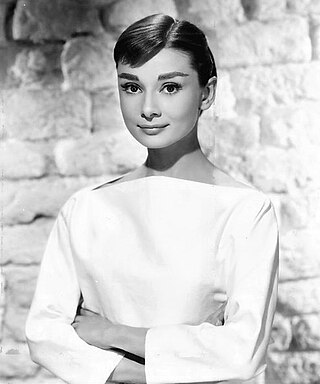
Audrey Kathleen Hepburn was a British actress. Recognised as a film and fashion icon, she was ranked by the American Film Institute as the third-greatest female screen legend from the Classical Hollywood cinema and was inducted into the International Best Dressed Hall of Fame List.
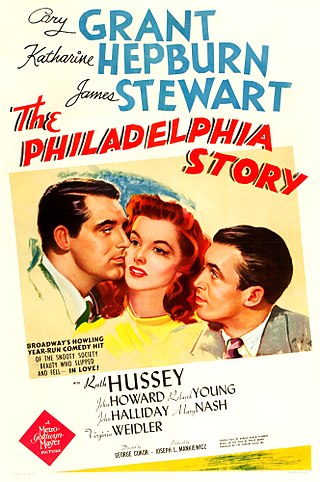
The Philadelphia Story is a 1940 American romantic comedy film starring Cary Grant, Katharine Hepburn, James Stewart and Ruth Hussey. Directed by George Cukor, the film is based on the 1939 Broadway play of the same name by Philip Barry about a socialite whose wedding plans are complicated by the simultaneous arrival of her ex-husband and a tabloid magazine journalist. The socialite, played by Hepburn in both productions, was inspired by Helen Hope Montgomery Scott (1904–1995), a Philadelphia heiress who had married Barry's friend.

Woman of the Year is a 1942 American romantic comedy-drama film directed by George Stevens and starring Spencer Tracy and Katharine Hepburn. The film was written by Ring Lardner Jr. and Michael Kanin, and produced by Joseph L. Mankiewicz.
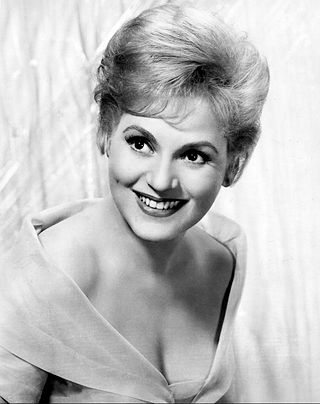
Judy Holliday was an American actress, comedian and singer.

Mommie Dearest is a memoir and exposé written by Christina Crawford, the adopted daughter of Academy Award winning actress Joan Crawford. Published in 1978, it attracted much controversy for its portrayal of Joan Crawford as a cruel, unbalanced, and alcoholic mother, with Crawford's other twin daughters, household staff, and family friends denouncing it as sensationalized fiction. It was turned into a 1981 film of the same title starring Faye Dunaway.

Betty Joan Perske, professionally known as Lauren Bacall, was an American actress. She was named the 20th-greatest female star of classic Hollywood cinema by the American Film Institute and received an Academy Honorary Award in 2009 in recognition of her contribution to the Golden Age of motion pictures. She was known for her alluring, sultry presence and her distinctive, husky voice. Bacall was one of the last surviving major stars from the Golden Age of Hollywood cinema.

Katharine Houghton is an American actress and playwright. She portrayed Joanna "Joey" Drayton, a white woman who brings home her black fiancé to meet her parents, in the 1967 film Guess Who's Coming to Dinner. Katharine Hepburn, who played the mother of Houghton's character in the film, was Houghton's aunt. She is also known for her role as Kanna, Katara and Sokka's grandmother in the film The Last Airbender (2010).
Tea at Five is a 2002 one-woman play, written by Matthew Lombardo, which tells the story of Katharine Hepburn in a monologue. It is based on Hepburn's book Me: Stories of My Life. The initial production of the play starred Kate Mulgrew, and was apparently written with her in mind for the part.

A Bill of Divorcement is a 1932 American pre-Code drama film directed by George Cukor and starring John Barrymore and Katharine Hepburn in her film debut. It is based on the 1921 British play of the same name, written by Clemence Dane as a reaction to a law passed in Britain in the early 1920s that allowed insanity as grounds for a woman to divorce her husband. It was the second screen adaptation of the play; the first was a 1922 British silent film also titled A Bill of Divorcement. The film was made again in 1940 by RKO Pictures.
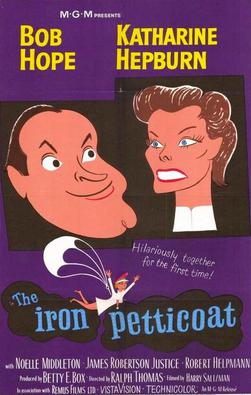
The Iron Petticoat is a 1956 British Cold War comedy film starring Bob Hope and Katharine Hepburn, and directed by Ralph Thomas. The screenplay by Ben Hecht became the focus of a contentious history behind the production, and led to the film's eventual suppression by Hope. Hecht had been part of the screenwriting team on the similarly themed Comrade X (1940).

Andrew Scott Berg is an American biographer. After graduating from Princeton University in 1971, Berg expanded his senior thesis on editor Maxwell Perkins into a full-length biography, Max Perkins: Editor of Genius (1978), which won a National Book Award. His second book Goldwyn: A Biography was published in 1989.

Lucinda Walsh is a fictional character on the CBS soap opera As the World Turns (ATWT). Elizabeth Hubbard played the role from April 1984 until the show's final episode on September 17, 2010. The character is described as a no-nonsense businesswoman and mega-mogul who transformed into one of daytime's most memorable and prolific characters. Hubbard left the show briefly in March 1999, but returned in August of that year. A loving mother and grandmother, while still retaining her edge fiery nature, she has been front and center in some of the show's biggest stories.

Funny Girl is a 1968 American biographical-musical film directed by William Wyler and written by Isobel Lennart, adapted from her book for the stage musical of the same title. It is loosely based on the life and career of comedienne Fanny Brice and her stormy relationship with entrepreneur and gambler Nicky Arnstein.
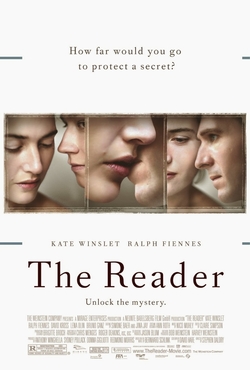
The Reader is a 2008 German-American romantic drama film directed by Stephen Daldry, written by David Hare on the basis of the 1995 German novel of the same name by Bernhard Schlink, and starring Kate Winslet, Ralph Fiennes, David Kross, Bruno Ganz and Karoline Herfurth.

Travels with My Aunt is a 1972 American comedy film directed by George Cukor, written by Jay Presson Allen and Hugh Wheeler, and starring Maggie Smith. The film is loosely based on the 1969 novel of the same name by Graham Greene. The film's plot retains the book's central theme of the adventurous, amoral aunt and her respectable middle class nephew drawn in to share her life, and also features her various past and present lovers who were introduced in the book, while providing this cast of characters with different adventures to the ones thought up by Greene, in different locales. It was released on December 17, 1972.
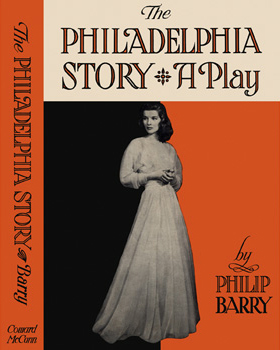
The Philadelphia Story is a 1939 American comic play by Philip Barry. It tells the story of a socialite whose wedding plans are complicated by the simultaneous arrival of her ex-husband and an attractive journalist. Written as a vehicle for Katharine Hepburn, its success marked a reversal of fortunes for the actress, who was one of the film stars deemed "box office poison" in 1938.

The Glass Menagerie is a 1973 American made-for-television drama film based on the 1944 play of the same name by Tennessee Williams. It is directed by Anthony Harvey and stars Katharine Hepburn, Sam Waterston, Joanna Miles and Michael Moriarty. It marked the third screen adaptation of the play. It originally aired on ABC as part of the network's ABC Theater series.
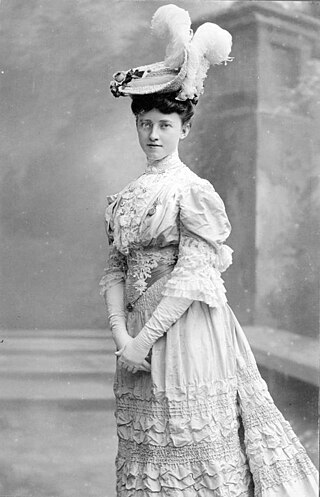
Katharine Smith Reynolds, later Katharine Smith Johnston, was the wife of tobacco tycoon R. J. Reynolds and a philanthropist who designed the Reynolda House estate.



















